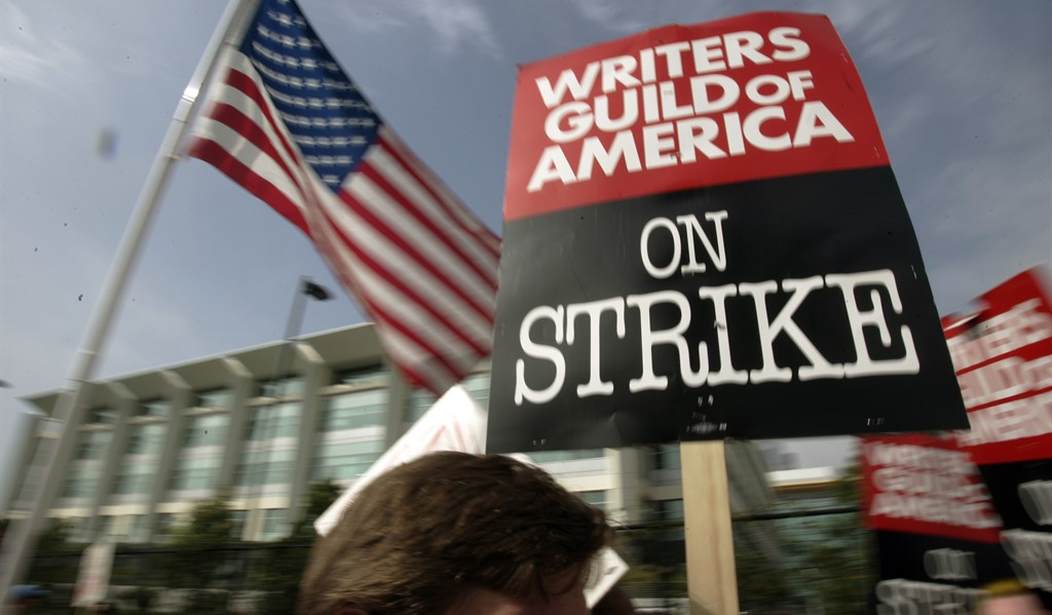(Robert Morton is a media, financial, and policy analyst whose research expertise includes Hollywood, the credit markets, and COVID-19 data.)
Even before the Directors Guild of America (DGA) reached a deal with the Alliance of Motion Picture and Television Producers (AMPTP), it was a foregone conclusion that the Writers Guild of America (WGA) would be lucky to escape without rollbacks in their contract negotiations and subsequent strike.
WGA membership has once again thrown its weight behind an organization that, in its last brilliant maneuver, forced writers to fire their agents to leverage agencies out of the production business. The WGA “won” by reducing agent incentive to re-sign all but the highest-earning writers on the eve of substantial content and labor cuts.
Genius.
Now I observe the writers, who certainly have firm moral standing in demanding the highest possible compensation for their work, cheer, and picket in solidarity for another foolish idealistic crusade.
The writers stridently demand higher pay with a garnish of featherbedding at the precise moment the studios have curtailed content and organization-wide labor expenses because streaming economics stink, inflation is reducing subscriber spend, and there’s a recession on the way.
Genius.
Here’s the unfortunate reality: streaming media fundamentally altered entertainment economics. Prior to streaming, content would filter from its original exhibition window through ancillary windows, each one creating a revenue stream for the producing studio. A movie would play for months in theatres globally, and then begin the journey across video-on-demand (VOD), DVD, pay TV, network, free cable, and local syndication. There was even a smattering of loose change from airline deals and revival cinemas.
Today, a movie plays in theatres for a few weeks, then is either streamed directly on the host studio’s platform or licensed to the big streamers – if it doesn’t actually premiere on a streaming service. It doesn’t take a genius – or maybe it does — to realize that the effective elimination of all other ancillary markets means significantly less revenue is generated for the studios.
Streaming media is not terribly profitable, much less generative of free cash flow, and the major streamers have already maxed out subscriber bases. Disney’s streaming business is still losing money — $659 million in the last quarter alone — despite a subscriber base of over 200 million across Disney+, Hulu, and ESPN+.
Disney management presents wildly optimistic rhetoric to analysts that streaming will be profitable in FY2024. Yet subscriber count is already declining and there’s a price increase around the corner. Meanwhile, viewers recognize that they have too many streaming providers and are culling the herd.
Netflix has topped out in subscribers and only achieved positive free cash flow in 2020, due to a pandemic that kept everyone at home with nothing to do. Netflix is also raising prices, but along with Disney is introducing cheaper ad-supported platforms as a desperate retention play.
Amazon is spending $15 billion on content this year, the most among streamers. It’s difficult to assess the division’s profitability. Do consumers join Prime for the free shipping and enjoy the streaming as a perk, or vice-versa? The former is more likely, and new Prime subs have also leveled off. How long before Amazon decides that $15 billion is too much to spend as a loss leader?
The same goes for Apple. How many iPhones is $6 billion of content selling? The fact that Apple doesn’t disclose how many subs is a red flag to anyone paying attention.
In my experience, there aren’t a lot of creatives that understand economics. They just see the headline that Disney made $3.2 billion last year, insist that’s too much, and therefore writers should get paid more than they do.
That’s why the DGA struck a deal that will likely resemble what the WGA will settle for while still proclaiming victory. The DGA deal includes the standard modest increases to minimum pay; a 76% increase in foreign residuals for streaming content; establish jurisdiction and terms for streaming reality shows and those made for free streaming networks; and other modest work-related improvements.
That’s all they could have hoped for, and they got it. The Writers Guild will eventually realize that they’ll be able to get similar increases in minimum compensation, and increase in streaming foreign residuals, and perhaps small increases in their pension and health plans. The question is how long the guild will keep the strike going in order to save face.
The dumbest argument I see on the picket signs is that writers can’t earn a living in the current environment. I invoke the words of a famous producer, “You don’t make a living as a screenwriter, you’re either rich or you’re broke.” The other stupid messaging is “Pay your writers!” as if they aren’t earning generous salaries as it is.
This will all be over soon, and the WGA can go back to enjoying their privileged rich white elitist lives while paying hypocritical lip service to DEI initiatives, and writing content that continues to lose audiences.













Join the conversation as a VIP Member